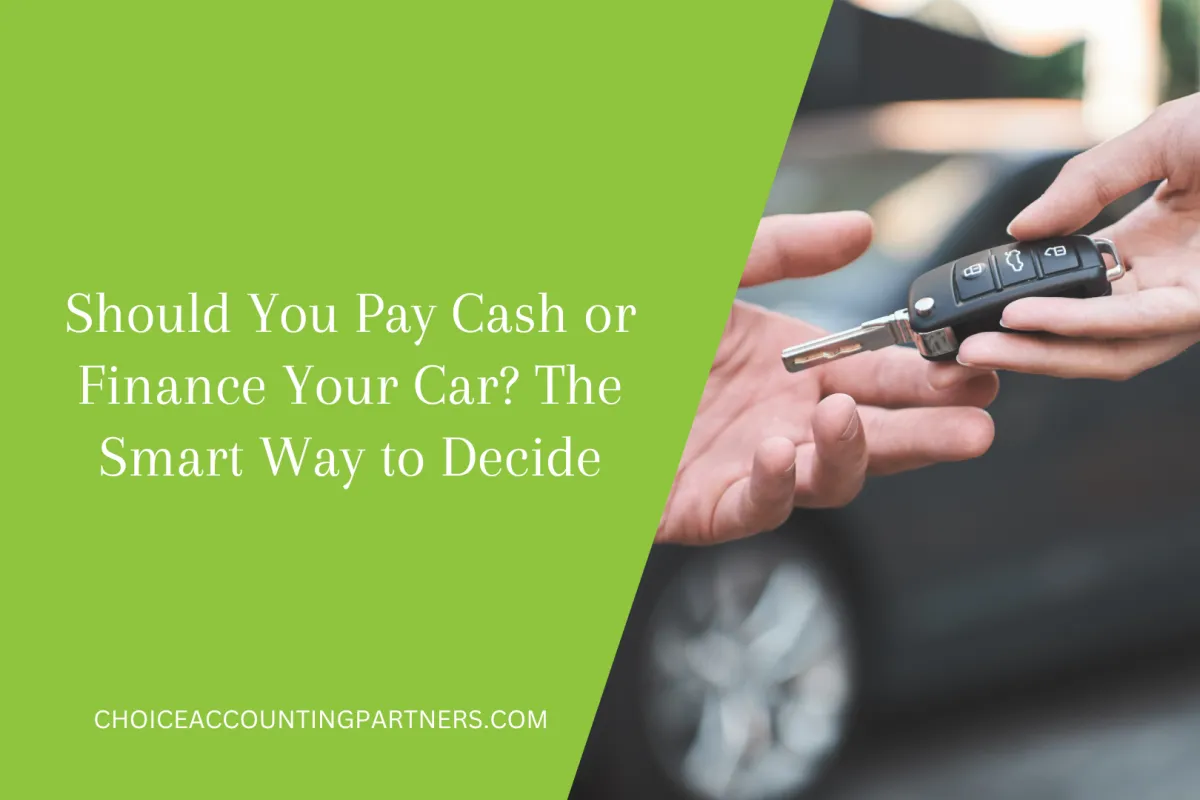

ON THE BLOG

Should You Pay Cash or Finance Your Car? The Smart Way to Decide
Should You Pay Cash or Finance Your Car? The Smart Way to Decide
Introduction:
When buying a car, one of the biggest financial decisions is whether to pay in cash or finance with a loan. Some experts say, "Always pay cash and avoid debt," but that’s not always the best choice. Depending on your financial situation and loan options, financing could work in your favor. Understanding the pros and cons of each option will help you make the right decision for your financial future.

Understanding Your Options
The best decision comes down to two key factors:
• The interest rate on your loan compared to potential investment returns.
• Your current financial position, including savings and other expenses.
Both options have advantages and drawbacks, and the right choice depends on your goals, financial habits, and long-term plans.
Why Paying Cash Can Be a Smart Move
If you have enough savings, buying a car outright can provide several benefits:
1. No Interest Payments
Car loans come with interest, which adds up over time. The longer the loan term, the more you’ll pay in interest—often thousands of dollars. Paying cash eliminates these extra costs, making the car more affordable in the long run.
2. Helps You Stick to Your Budget
Financing can make expensive cars seem affordable by breaking the cost into monthly payments. This can lead to overspending. When you pay in full, you’re more likely to buy a car within your budget, ensuring that you don’t commit to payments that could strain your finances.
3. Full Ownership and Flexibility
With a loan, the lender holds the car’s title until you’ve paid it off. If you stop making payments, they can repossess it. Owning your car outright gives you the freedom to sell or trade it anytime without financial restrictions. There’s also no risk of negative equity, where you owe more on the loan than the car is worth.
4. Lower Insurance Costs
Some lenders require comprehensive insurance coverage for financed cars, which can be expensive. When you own your car outright, you have more flexibility in choosing your coverage, potentially lowering your insurance costs.
When Financing a Car Makes Sense
There are situations where taking out a loan can be a better financial move:
1. You Can Invest Your Money for Higher Returns
If your car loan has a low interest rate (e.g., 3-4%) and you expect to earn a higher return (e.g., 6-7%) on investments, financing allows you to keep your cash working for you. This strategy is especially useful if you’re confident in your investment strategy and have a strong financial cushion.
2. You Have High-Interest Debt
If you have credit card debt with 20%+ interest, it’s smarter to use your cash to pay that down instead of spending it all on a car. Financing a car at a lower rate frees up money to tackle more expensive debt, improving your overall financial situation.
3. You Want to Build Credit
Making on-time car loan payments can improve your credit score, which helps with future financing opportunities like home loans or business credit. This is especially important if you have a limited credit history and need to establish a strong credit profile.
4. You Don’t Have Enough Cash
If you need a car but don’t have enough savings, financing is your only option. In this case, buy the most affordable, reliable vehicle you can, make a sizable down payment, and choose a short loan term to reduce interest costs. This minimizes your overall financial burden while ensuring you get reliable transportation.
5. You Want to Keep Emergency Savings Intact
Spending a large portion of your savings on a car can leave you vulnerable in case of an emergency. Financing allows you to preserve your cash reserves for unexpected expenses, such as medical bills or home repairs, providing financial security.
Choosing the Right Financing Option
If you decide to finance, it’s important to compare different lending options:
• Bank Loans: Often have competitive rates but stricter approval criteria. Banks may offer discounts for existing customers.
• Credit Union Loans: Typically offer lower interest rates and more flexible terms compared to banks. They are often more willing to work with borrowers with average credit.
• Dealer Financing: Convenient but may come with higher interest rates or additional fees. Some dealerships offer promotional financing deals, such as 0% interest, but only for buyers with excellent credit.
• Alternative Financing: Leasing or personal loans might work for certain buyers but often come with higher costs. Leasing can lower monthly payments, but you won’t own the car at the end of the lease term.
When financing, always check the loan terms, interest rate, and total repayment cost to ensure it fits your financial plan.
Final Thoughts
There’s no universal right or wrong choice—it depends on your financial goals and situation. If you can get a low interest rate and invest your money wisely, financing can make sense. But if avoiding debt and owning your car outright is a priority, paying cash is the better path. Consider your current financial position, future goals, and the total cost of ownership before making a decision.
FAQs
What are the downsides of paying cash for a car?
It can drain your savings and limit your financial flexibility for other important expenses or investments. If an emergency arises, you may not have enough cash on hand to cover unexpected costs.
Why do dealerships prefer financing?
Dealerships often earn commissions or incentives from lenders when buyers choose financing. This is why salespeople may encourage financing over cash payments.
How can I negotiate the best car price?
Research market prices, be willing to walk away, and avoid revealing your payment method upfront. Focus on negotiating the total price of the car first, before discussing financing terms.
What are the benefits of financing through a credit union?
Lower interest rates, more flexible loan terms, and personalized service compared to traditional banks. Credit unions often work with members to find the best financing solutions.
Is leasing a better option than financing?
Leasing can be a good option if you want lower monthly payments and prefer driving a new car every few years. However, you won’t own the car at the end of the lease, and there may be mileage limits and wear-and-tear fees.
Need Help Making the Right Financial Decision?
Our expert financial advisors can help you evaluate your options and choose the best strategy for your car purchase. Whether you're looking to maximize savings, improve your credit, or optimize your investments, we’re here to guide you.
If you found this helpful, share it with a friend who’s car shopping! 🚗💰
📌 Follow us for more tax and financial tips!
Disclaimer: This blog is for informational and educational purposes only and does not constitute financial, legal, or real estate advice. Always consult with a licensed professional before making financial decisions.





